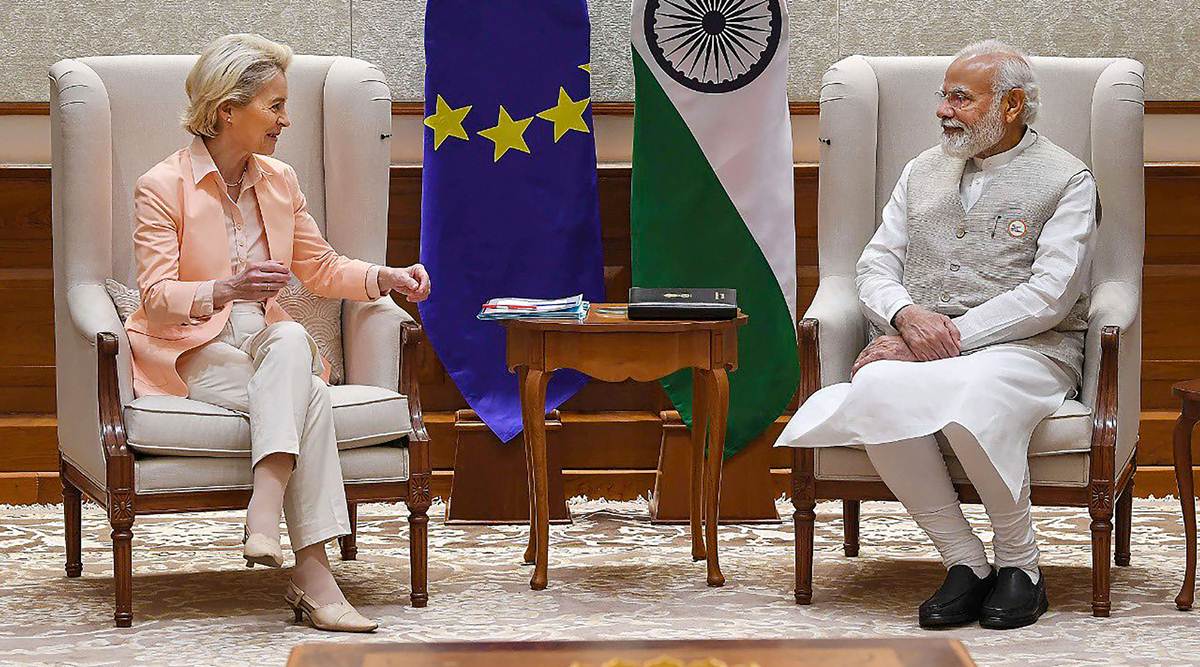 PM Narendra Modi with European Commission President Ursula von der Leyen in New Delhi on Monday. (PTI)
PM Narendra Modi with European Commission President Ursula von der Leyen in New Delhi on Monday. (PTI) With Prime Minister Narendra Modi listening, visiting European Commission President Ursula von der Leyen on Monday described the killings in Bucha as “severe violations of international law” and said what is happening in Ukraine will impact the Indo-Pacific region.
She said the outcome of the war will not only determine the future of Europe, but also “deeply affect the Indo-Pacific region and the rest of the world”.
“For the Indo-Pacific region, it is as important as for Europe, that borders are respected, and that spheres of influence are rejected,” she said, while addressing the Raisina Dialogue. The core principles that underpin peace and security across the world, she said, are at stake in Asia as well as in Europe.
The Prime Minister attended the event, but did not speak. Foreign Ministers of Poland, Argentina and several other countries too attended the event.
“This is a defining moment. Our decisions these days will shape decades to come. Our response today will decide the future of both the international system and the global economy. Will the rights of might dominate, or the rule of law? Will there be constant conflict and struggle or will there be a future of common prosperity and lasting peace?” she said.
“This is why we are doing all we can to help Ukraine fight for freedom. This is why we need to impose massive, sharp and effective sanctions. Sanctions are never a standalone solution… This is why we have designed the sanctions in a way to sustain them over a longer period of time, because this gives us leverage to achieve a diplomatic solution that will bring lasting peace. And we urge all members of the international community to support our efforts for lasting peace,” she said, in an oblique reference to soliciting Delhi’s support.
A former Defence Minister of Germany, President von der Leyen said, “We all see the rising challenges to our open and free society. This is true for the technological and the economic domain. But it is also true for security… The core principles that underpin peace and security across the world are at stake in Asia as well as in Europe.”
She said “Russia and China have forged a seemingly unrestrained pact”.
“They have declared that the friendship between them has no limits. That there are no forbidden areas of cooperation. This was in February this year. And then the invasion of Ukraine followed. What can we expect from the new international relations?” she said.
She said the images coming from Russia’s attack on Ukraine have shocked and are shocking the whole world.
Recalling her visit to Bucha earlier this month, she said, “I saw with my own eyes the bodies lined up on the ground. I saw the mass graves. I listened to survivors of an atrocious crime Kremlin’s soldiers committed. These are severe violations of international law — killing innocent civilians, redrawing borders by force, subjugating the will of a free people. This goes against core principles enshrined in the UN Charter. In Europe, we see Russia’s aggression as a direct threat to our security.”
“We will make sure that the unprovoked and unjustified aggression against Ukraine will be a strategic failure,” she said.
Earlier in the day, India and the European Union decided to establish a “Trade and Technology Council” (TTC), a “strategic coordination mechanism” that is aimed to “tackle challenges at the nexus of trade, trusted technology and security”.
This was the key outcome after von der Leyen and Modi held their bilateral meeting.
Sources told The Indian Express that with Beijing’s increased use of trade and technology as a coercive tool, there is growing agreement with partners to cooperate on trade and technology.
The TTC is an important format in EU’s calculus, and the only other country with which the grouping has a TTC is the US. It was announced in June ‘2021, and has started functioning through “working groups”.
“Today, our relationship is more important than ever. We have so much in common. We are vibrant democracies, we both support wholeheartedly the rules-based international order and we have both large economies, and we are both facing a challenging global landscape. For the European Union, the partnership with India is one of our most important relationships for the coming decade and strengthening this partnership is a priority,” she said.
“I am thinking of three main topics – trade, technology and security. That is why I am pleased that today Prime Minister Modi and I have agreed to establish an EU-India Trade and Technology Council. The EU has only one TTC so far – with the US, and I think it is telling that we now establish the second one with India. Also, because India is technologically a powerhouse, and in the trade sector we need to unleash an enormous amount of untapped potential,” she said.
A joint statement said, “Both sides agreed that rapid changes in the geopolitical environment highlight the need for joint in-depth strategic engagement. The Trade and Technology Council will provide the political steer and the necessary structure to operationalise political decisions, coordinate technical work, and report to the political level to ensure implementation and follow-up in areas that are important for the sustainable progress of European and Indian economies.”
- The Indian Express website has been rated GREEN for its credibility and trustworthiness by Newsguard, a global service that rates news sources for their journalistic standards.

